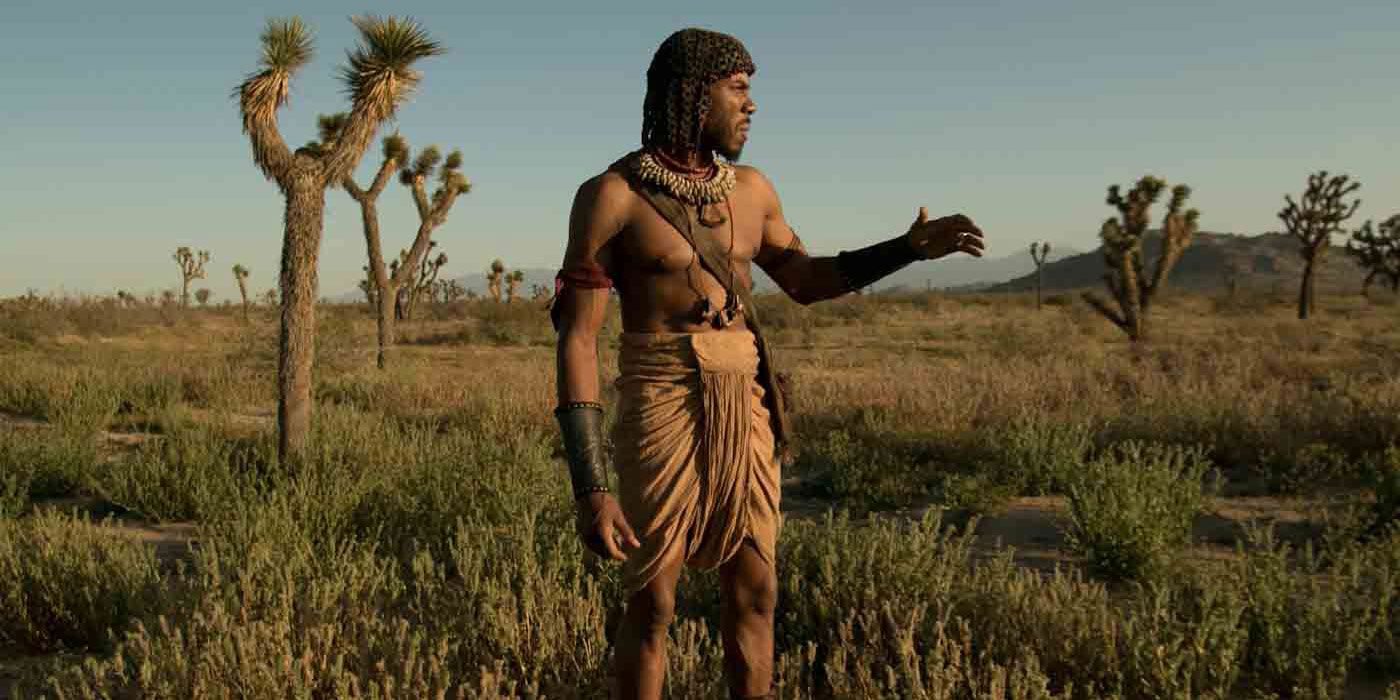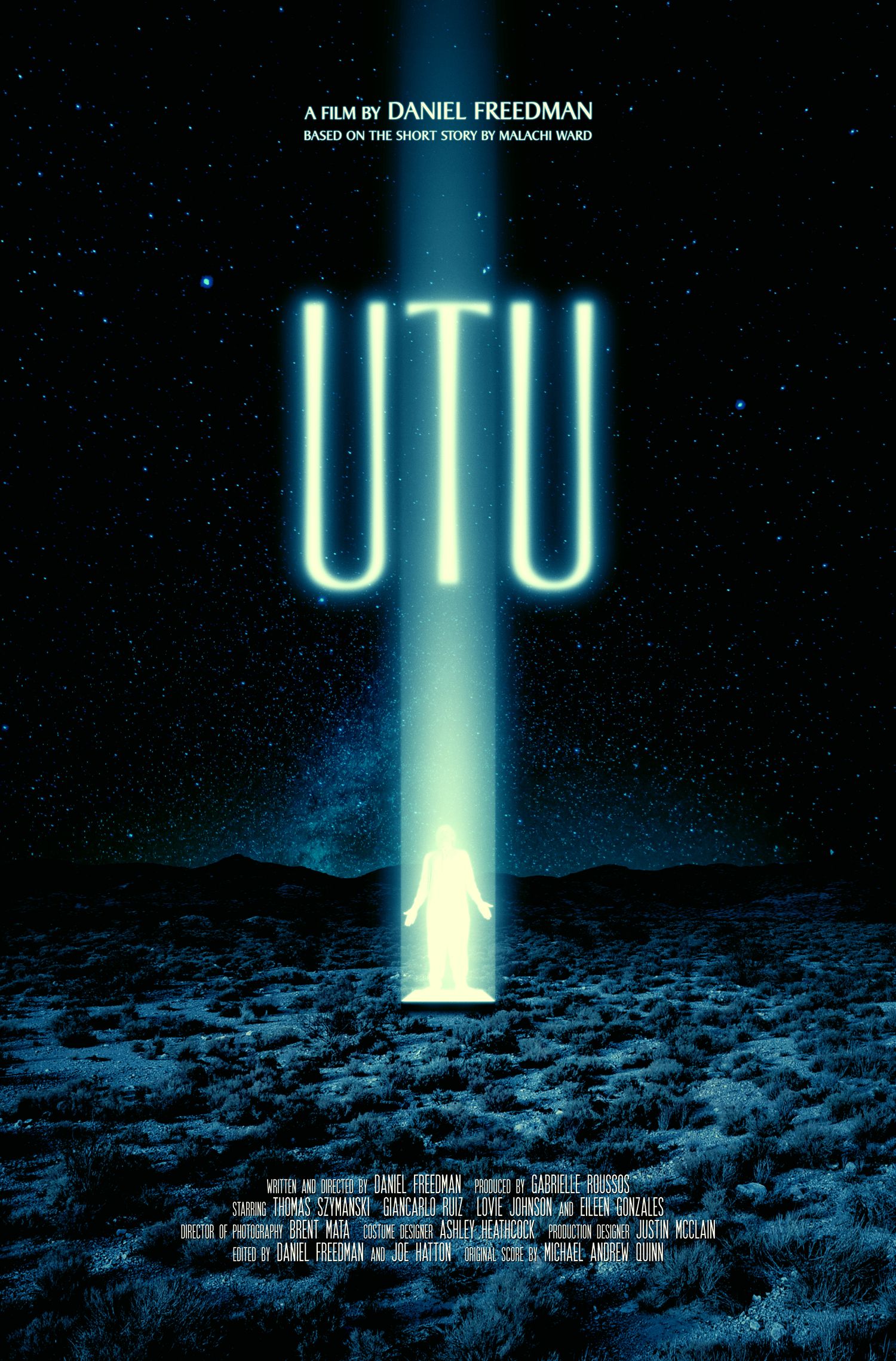Push aside the danger of “temporal anomalies.” Shove the theoretical dangers of encountering a past version of yourself to the side. Put away even the terrifying possibility a younger version of your mother might try to make out with you. If you dig deep enough, time travel stories are about ego. It’s a unifying theme. Consider the hubris required to believe you could “fix’ time, or wield the secret knowledge gained by traveling into the future.
Ego is the driving force in UTU, writer/director Daniel Freedman’s short film adaptation of Malachi Ward’s 2009 comic of the same name. Best known for his Image Comics series Undying Love and Burn the Orphanage, Freedman takes to the screen with the short-form epic. Adopting visual cues from Conan the Barbarian, 2001: A Space Odyssey and THX 1138, UTU tells the story of a near future scientist, Utu, who appears as a glowing god to an ancient human shaman with the intention of erasing a pivotal moment from human history: the first wide-scale human conflict.
RELATED: Image’s Ancestor Ponders Free Will in the Age of Smart Phones
Though the film is less than 22 minutes long and only features a handful of characters, including Thomas Szymanski as Utu, Giancarlo Ruiz as the beleaguered Shaman, Eileen Gonzales as the ancient queen Mun-Gal,and Love Johnson as the warrior/guard Kab-Ta, Freedman packs a heavy dose of high concept, morally probing classic sci-fi tone into its scenes. It’s not hard to imagine UTU as an episode of The Twilight Zone or The Outer Limits.
“I've always struggled with time travel as wish fulfillment,” Freedman told CBR, noting that to “undo” what defines history is to miss the “spiraling” nature of time itself, and more importantly, how humanity interacts with its own history. Just as crucially, Freedman suspects that perhaps time wouldn’t be an indifferent force in regards to its potential rejiggering.
“Try to mess with time and time will mess with you right back,” Freedman said.
Ward, whose work on Image’s Prophet and Ancestor ponders similarly heady concepts, says UTU approaches time from a fantastical angle, opting out of physics in general in favor of a view more lyrical and exploratory.
“This is all a fantastical way of presenting time, of course, rather than some kind of hard sci-fi model, which probably wouldn't allow for time travel at all,” Ward said.
Upon first reading Ward’s web comic back in 2016, Freedman was struck by its unique aesthetic. Even more, he was impressed by Ward’s inherent trust of the reader. He’d grown bored with science fiction TV and film telegraphing concepts and ideas at the expense of the viewer’s engagement. UTU offered “a real break away from those generic routine stories.”
“It was weird and different and gave me as a reader the opportunity to think,” Freedman says.
After a successful Kickstarter campaign to complete the film’s visual effects, the short debuted on Vimeo earlier this year. Though the original UTU stories were published nearly a decade ago, its suggestion -- that new technologies will never better our way of life unless we truly grapple with the immensity of human nature -- rings out in an era that finds Americans breaking down the cost/benefits of social media’s influence in our lives.
“It’s unlike any other tech that has ever existed,” Freedman said of social media. “It literally connects the world and allows us to communicate from across the globe, something that would have been reserved for gods back in the day…[but] instead of conversing and understanding each other, we argue, fight, criticize, judge, and shame. The tech that gave everyone a voice has become not a way of connecting but a way of projecting. Everyone from Kanye to the president to your parent's neighbor uses it not to ask questions and understand but to proclaim and impose personal views. Thematically, UTU is about how no matter what god-like technology we create, we'll never rise above our baser human instincts.”
Freedman and Ward have developed further ideas for exploring the world of UTU, expanding the short film into a potential full-length feature. For the creators, the concepts the film explores don’t seem in danger of becoming irrelevant any time soon.
RELATED: Freedman & Coker Get Romantic with Undying Love
“Only someone profoundly incorrect about how humans behave and the history that is a product of that behavior would think they could change things the way Utu attempts,” Ward said. “He feels like he has no control over his contemporary life, over the world as it is, but he somehow thinks he can control a people and a place he has even less understanding of. I think those kinds of issues might always be relevant.”
UTU is now streaming on Vimeo. [Link: https://vimeo.com/233072562 ] The original comic stories can be read at Study Group Comics.



